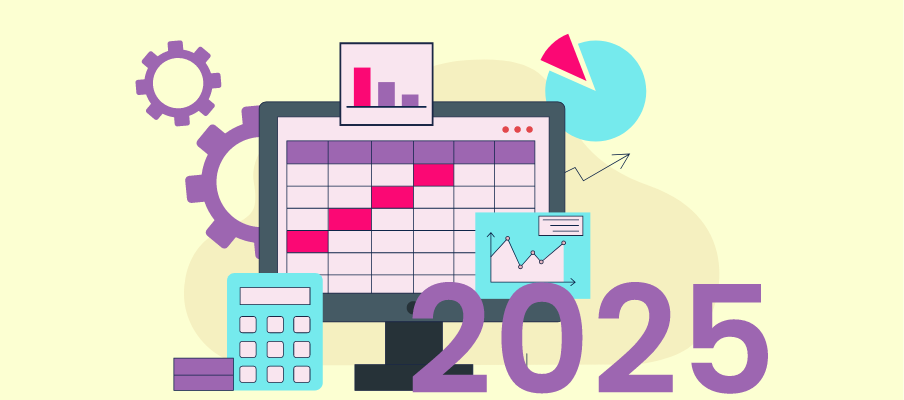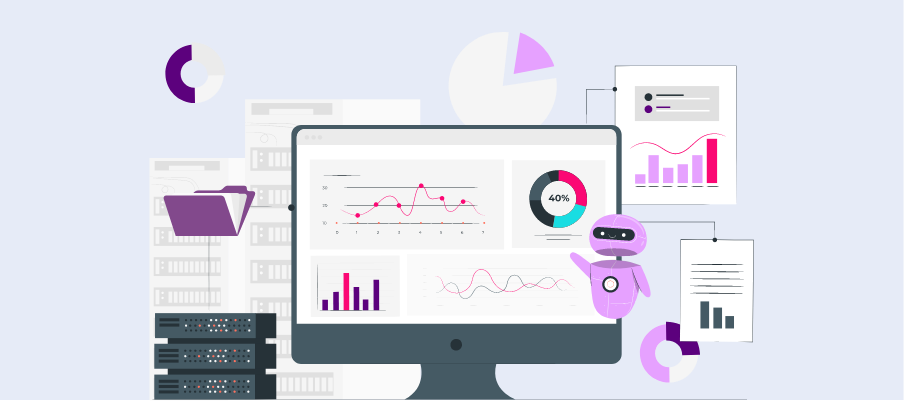Automated Data Entry: AI can extract, categorize, and record financial data from invoices, receipts, and bank statements automatically, eliminating manual data entry.
How AI and Automation Are Transforming Bookkeeping in 2025

Did you know that by 2025, 80% of bookkeeping tasks can be fully automated? This paradigm shift is rewriting how businesses approach financial management, making mundane, repetitive tasks a thing of the past.
From manual, error-prone ledgers to powerful AI-driven tools, bookkeeping has evolved tremendously. And we're now standing on the cusp of its most significant transformation yet. Artificial Intelligence (AI) and automation are changing the game—streamlining workflows, reducing errors, and enabling real-time insights that empower businesses.
But what exactly does this mean for small business owners, accountants, and financial managers? This blog will explore the current state of bookkeeping, the role of AI and automation in its transformation, emerging trends, and actionable steps to prepare your business for the future.
The Current State of Bookkeeping in 2025
Traditional bookkeeping, while foundational, has its challenges. Tasks like data entry, reconciliation, and financial reporting are time-intensive and prone to human error. These inefficiencies can impact growth and decision-making, especially for small business owners juggling multiple responsibilities.
Fast forward to 2025, and bookkeeping has entered an era intertwined with AI and automation. According to a recent study, over 70% of small businesses now leverage AI-powered tools for some or all their bookkeeping tasks. Unlike earlier digital tools, these systems don’t just record data—they analyze it, correct mistakes, and provide actionable financial forecasts.
The Shift to AI in Numbers
Consider this case study from QuickBooks AI. One small business reduced its bookkeeping hours by 60% after automating its payroll and invoice management with AI tools. These statistics are not anomalies but indicators of a rapidly growing trend.
How AI is Revolutionizing Bookkeeping
Artificial intelligence is transforming bookkeeping by making it more efficient, accurate, and accessible for businesses of all sizes. Traditional bookkeeping processes, which are often time-consuming and prone to human error, are being replaced by AI-driven systems capable of handling complex financial tasks with far greater speed and precision. Here's how AI is revolutionizing bookkeeping:
Error Detection and Prevention: AI systems can detect anomalies like duplicate entries or inconsistent transactions, allowing businesses to correct errors before they become issues.
Real-Time Reporting: With AI, businesses can access up-to-the-minute financial reports, enabling quicker and more informed decision-making.
Predictive Analytics: AI-powered tools analyze historical data to provide forecasts, helping businesses anticipate cash flow trends and budget accordingly.
Enhanced Compliance: AI ensures that financial records comply with regulations by monitoring changing tax laws and automating tax calculations.
These advancements not only save time but also empower businesses to focus on strategic growth rather than tedious financial tasks.
AI Tools Leading the Charge
QuickBooks AI for automated invoicing and cash flow projections.
Xero offers seamless integration of machine learning and ledger management.
Zoho Books doubles as a fraud-monitoring tool and report generator.
Ziepie Fintech provides automated bookkeeping solutions tailored for small and medium businesses, as well as accounting firms.
Automation in Bookkeeping: Efficiency at Scale
Automation in bookkeeping is transforming how small businesses manage their finances. By taking over tasks like payroll, reconciliations, and invoice follow-ups, automation saves valuable time for business owners, allowing them to focus on growth and strategy. It also significantly reduces errors, ensuring financial accuracy and avoiding costly mistakes caused by manual processes.
In addition to time and error reduction, automation leads to major cost savings. By streamlining repetitive tasks, businesses can lower expenses tied to staffing or outsourcing. For example, one small eCommerce business adopted automated reconciliation software and saw a 35% drop in accounting costs within just one quarter. This shows how automation can deliver both efficiency and financial benefits.
Key Trends Shaping Bookkeeping in 2025
AI and Machine Learning Integration
Artificial intelligence (AI) and machine learning are revolutionizing bookkeeping by enabling predictive analytics and real-time financial insights. These technologies are expected to play an even larger role in 2025, automating complex tasks like expense categorization and fraud detection with unparalleled accuracy.
Cloud-Based Bookkeeping Solutions
Cloud technology continues to dominate the bookkeeping landscape, offering secure, accessible, and scalable solutions for businesses of all sizes. By 2025, more companies will adopt cloud-based platforms to ensure seamless collaboration and up-to-date financial data accessible from anywhere.
Growing Importance of Data Security
With increasing reliance on digital tools, the protection of sensitive financial information will become a top priority. Enhanced cybersecurity measures, such as blockchain technology and multi-factor authentication, will shape the future of secure bookkeeping practices.
Customization and Industry-Specific Tools
Businesses will demand tailored bookkeeping solutions that cater to their specific industries. By 2025, niche-focused software and customizable features will dominate, making bookkeeping more efficient and aligned with unique business needs.
Sustainability and Green Accounting Practices
Environmental concerns will influence bookkeeping trends, giving rise to green accounting practices. Tracking carbon footprints, digital record-keeping to minimize paper use, and sustainability-focused reporting will be integrated into bookkeeping systems.
These trends highlight a dynamic shift toward technology-driven, adaptable, and secure bookkeeping practices, positioning businesses to leverage financial data more effectively in the years ahead.
Traditional vs. AI-Powered Bookkeeping
Challenges and Considerations
Potential Roadblocks
Cost of Implementation: While long-term savings are undeniable, high upfront costs can deter small businesses.
Data Security: Sensitive financial data stored in AI systems must be protected against breaches.
Resistance to Change: Traditional financial professionals may struggle to adopt new systems.
Skill Gaps: Employees may need training to effectively use AI tools.
Overcoming Challenges
Start small by automating specific tasks first.
Partner with AI consultants for expertise.
Invest in employee upskilling programs to bridge knowledge gaps.
The Future of Bookkeeping
Beyond 2025
The combination of quantum computing, advanced AI algorithms, and fully autonomous financial systems will likely take bookkeeping capabilities to unprecedented heights. Imagine fully self-auditing books and financial reports generated with 100% accuracy, all at the click of a button.
Staying Ahead of the Curve
Businesses that adopt AI now will not only save costs but also gain a competitive advantage, as they improve operations while competitors play catch-up.
Final Thoughts
AI and automation represent a pivotal moment for bookkeeping, transforming the way financial management is handled. These technologies are making processes more efficient, accurate, and accessible, providing small business owners and accountants with tools that save time and reduce manual workload. From automating data entry and categorizing expenses to generating real-time financial reports, AI is simplifying complex tasks and allowing businesses to focus on growth.
If you’re ready to take the next step, now is the perfect time to start exploring AI-powered bookkeeping tools. These solutions can help you stay on top of your finances, minimize errors, and gain deeper insights into your business. Embracing AI in bookkeeping isn’t just about convenience—it’s about revolutionizing how you manage your financial operations for a more productive and stress-free future.




